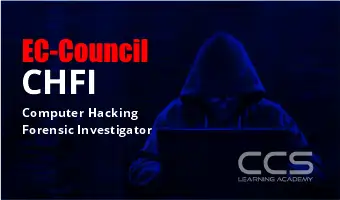Computer Hacking Forensic Investigator | CHFI
* Looking for a flexible schedule (after hours or weekends)? Please call 858-208-4141 or email us: sales@ccslearningacademy.com.
Student financing options are available.
Transitioning military and Veterans, please contact us to sign up for a free consultation on training and hiring options.
Looking for group training? Contact Us
Course schedule:About This Course
Course Description
The Computer Hacking Forensic Investigator (CHFI) course delivers the security discipline of digital forensics from a vendor-neutral perspective. CHFI is a comprehensive course covering major forensic investigation scenarios and enabling students to acquire necessary hands-on experience with various forensic investigation techniques and standard forensic tools necessary to successfully carry out a computer forensic investigation leading to the prosecution of perpetrators.
The CHFI certification gives participants (Law enforcement personnel, system administrators, security officers, defense and military personnel, legal professionals, bankers, security professionals, and anyone who is concerned about the integrity of the network infrastructure.) the necessary skills to perform an effective digital forensics investigation.
CHFI presents a methodological approach to computer forensics including searching and seizing, chain-of-custody, acquisition, preservation, analysis and reporting of digital evidence.
CHFI Course Benefits
- Inclusion of critical modules in Darkweb forensic and IoT Forensics
- Significant coverage of forensic methodologies for public cloud infrastructure, including Amazon AWS and Microsoft Azure
- Massive updates on all modules in CHFI
- Inclusion of latest forensic tools including Splunk, DNSQuerySniffer etc
- Addition of new techniques such as Defeating Anti-forensic technique, Windows ShellBags including analyzing LNK files and Jump Lists
- Extensive coverage of Malware Forensics (latest malware samples such as Emotet and EternalBlue )
- Now more than 50GB of crafted evidence files for investigation purposes
- More than 50% of new and advanced forensic labs
- In-depth focus on Volatile and Non-volatile data acquisition and examination process (RAM Forensics, Tor Forensics, etc.
- Accepted and trusted by cybersecurity practitioners across Fortune 500 globally.
FAQ’s
- What is a computer hacking forensic investigator?
CHFI is the process of detecting hacking attacks and properly extracting evidence to report the crime and conducting audits to prevent future attacks. - How long is the CHFI certification exam?
4 hours with 150 questions - What jobs can I get in computer forensics?
-
- Computer Forensics Technician.
- Information Security Analyst.
- Information Systems Security Analyst.
- Forensic Computer Analyst.
- Security Consultant.
- Computer Forensics Investigator.
Learning Objectives
Inclusions
- Certified Instructor-led training
- Official Training Seminar Student Handbook
- Collaboration with classmates (not currently available for self-paced course)
- Real-world learning activities and scenarios
- Exam scheduling support*
- Enjoy job placement assistance for the first 12 months after course completion.
- This course is eligible for CCS Learning Academy’s Learn and Earn Program: get a tuition fee refund of up to 50% if you are placed in a job through CCS Global Tech’s Placement Division*
- Government and Private pricing available.*
Pre-requisites
- It is strongly recommended that you attend Certified Ethical Hacker before enrolling in the CHFI program
Target Audience
- Anyone interested in cyber forensics/investigations
- Attorneys, legal consultants, and lawyers
- Law enforcement officers
- Police officers
- Federal/ government agents
- Defense and military
- Detectives/ investigators
- Incident response team members
- Information security managers
- Network defenders
- IT professionals, IT directors/managers
- System/network engineers
- Security analyst/ architect/auditors/ consultants







